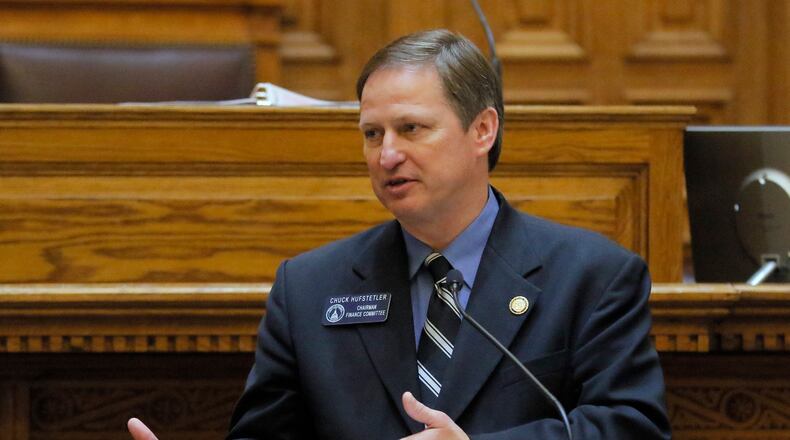Legislative leaders plan to move quickly to get companies to collect and remit more taxes they owe on internet sales in hopes of shoring up Georgia’s shaky budget.
Senate Finance Chairman Chuck Hufstetler, R-Rome, said he has worked with House colleagues since last session on an agreement that would close a loophole that allows many online retailers to skip sending in taxes on their sales.
Hufstetler said an agreement on the measure — which could mean hundreds of millions of dollars a year for the state — could come this week, the first of the 2020 General Assembly session. The measure's original sponsor last year, House Ways and Means Chairman Brett Harrell, R-Snellville, said he, too, hopes a deal can be reached quickly.
Hufstetler told reporters Monday: “We’ve got a revenue issue. But bigger than that, we have a collection issue. We need to be collecting money that is owed Georgia so that those that are paying their fair taxes don’t have to pay more.”
Senate Majority Leader Mike Dugan, R-Carrollton, said: "We are planning on being able to collect that money really quickly from out-of-state entities that has been due to our state for a while now. If it's owed, it needs to come in."
More legislature headlines
>> Protests and tough choices greet Georgia lawmakers for 2020 session
>> PHOTOS: Georgia’s 2020 legislative session kicks off
>> How the AJC covers the Georgia Legislature
The state may need the revenue to avoid further budget cuts. Tax collections have been slow since shortly after the General Assembly voted to cut the top state income tax rate in 2018. The state reported Monday that collections are up 0.3% for the first six months of fiscal 2020, which began July 1. Income tax collections alone are tracking about $300 million less than expected, analysts say.
Gov. Brian Kemp ordered state agencies in August to cut their budgets 4% this year and 6% next year. Ever since then, lawmakers have been looking for ways to raise revenue.
A report in June by a group called the Faith, Justice and Truth Project said the state is losing nearly $750 million a year in sales taxes not collected from big retailers who sell products or services online that are produced or provided by others — known as online "marketplace facilitators" of sales.
The state’s estimate on a similar measure is closer to $150 million a year — according to an accounting for House Bill 276 — which would have closed the loophole in collecting such taxes. HB 276, sponsored by Harrell, was designed to collect taxes from “facilitators” whose websites or apps are used to sell goods or services provided by someone else. Huffstetler pointed to Walmart’s site as an example.
Different versions of the measure passed the chambers last session, but the two sides couldn’t strike a deal.
Hufstetler said another measure would spur the Department of Revenue to use data analytics to ferret out potential fraud or people not paying taxes. If the state can get a large chunk of the money that’s due but not being collected, it could raise hundreds of millions of dollars more, he said.
Combined, the amount estimated would be more than enough to make up for any shortfall Kemp is concerned about. It could also allow Kemp to raise teacher pay this year, something that has been in doubt.
Kemp promised teachers a $5,000 pay raise in 2018 when he was running for governor. He made a major down payment in 2019, when the state included enough money to give teachers a $3,000 raise. Collecting taxes the state says are due may allow Kemp to offer a pay raise again this year.
A third source of revenue may be finding ways to spend less on the state’s film tax credit. Hufstetler and other lawmakers are pushing legislation to mandate that film projects that receive the tax credits be audited.
One of two state audits of the film tax credit program that were released last week was critical of the how it has been administered. The cost of the tax credits has grown from $141 million in 2010 to an estimated $870 million in 2019.
One report found that some film companies were receiving tax credits for ineligible expenditures, including flights by company executives and payments to staffers working outside the state.
The audit found that Georgia requires companies to provide less documentation than any of the 31 other states that offer a film tax incentive. Georgia is one of only three states that does not require an audit by the state or a third party of projects when they receive tax credits.
$150 million –Georgia legislators think more than this amount could be raised by closing a loophole in the collection of internet sales taxes.
$200 million – The amount necessary to meet Gov. Brian Kemp’s order to cut state spending by 4% this fiscal year.
$300 million – The amount necessary to meet Kemp’s order to cut state spending by 6% the next fiscal year.
About the Author
Keep Reading
The Latest
Featured




